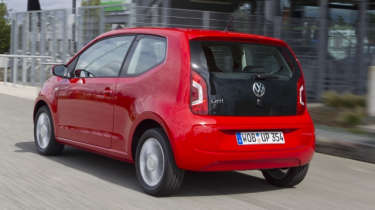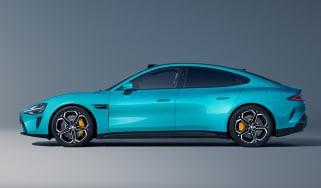Driven: Volkswagen Up city car
We drive Volkswagen's titchy new Up city car. Can it beat the Smart and Fiat 500?
What is it? Or, what's Up? The punsters are set for a very productive time with Volkswagen's new small car, a neat little box with a smiling face, a TV-screen-like rear window and proper space for four people. R&D boss Dr Ulrich Hackenberg predicts that sales of minimal-but-complete cars like this will rise by 20 per cent over next five years as people embrace low-CO2 cars and realise that such cars can do a proper job of people transport. And that, crucially, you can have a good time driving them. Technical highlights The idea for the Up – or Up! as Volkswagen would like us to write it, but we won't be doing that – came on a flight back to Germany after the 2007 Detroit show. Design director Walter de'Silva sketched out the shape and Dr Hackenberg came up with the idea of a rear engine mounted on its side. A concept car duly appeared, followed by various other versions – a five-door, a taxi, the Up! Lite sportier version. But the rear engine had to go, partly for reasons of cooling, mainly because the Up had to share many components from other current or future Volkswagens to be financially viable. So the production Up has the usual front engine, front-wheel drive and torsion beam rear axle, but the engine is a new, all-aluminium, three-cylinder unit of 1.0 litre and either 60 or 95bhp. There will also be a 68bhp CNG version with just 79g/km CO2 when mated to the robotised manual transmission option. The Up is just over 3.5m long, weighs under a tonne (as you would hope) and has very short overhangs. At the front this is achived by mounting the radiator to the left side of the engine instead of in front of it. What's it like to drive? Not remotely rapid. The 1.0-litre, 75bhp, 108g/km, five-speed manual takes 13.2sec to hit 62mph and runs out of steam at 106mph, and you need to stoke the engine mercilessly to stay with torquey, turbodiesel-powered traffic. But, as with many three-pots, it's a very likeable engine with a deep, smooth note and a response keener than than the figurtes suggest. Unusually for a triple, it has no balancer shaft. This small engine's reciprocating masses are too low to need balancing. This is a light, airy car, beautifully made and detailed, and designed in the kind of industrial way that suits the painted-metal door edges and the lack of any padding. The dashboard is glossy, and body-coloured in most versions, and on it sits, optionally, a Navigon sat-nav/economy meter/control screen which you can take out and use, Tom-Tom-like, for on-foot navigation. It will talk to your phone, too. Steering is by column-mounted EPAS, and feels crisp, quick and quite convincing of its type. The ride is firm on optional 16in wheels, nicely judged on 15ins with no obvious sacrifice in handling precision, of which the Up has plenty. This is a properly chuckable small car, which bodes well for hotter versions to come. There will also be a two-cylinder diesel hybrid if Dr Hackenberg can convince the bean-counters, and an electric Up is a certainty for 2013. How does it compare? Obvious rivals are the Citroen C1/Peugeot 107/Toyota Aygo, which are older and cruder, or the oddly uninspiring Renault Twingo. Its main opposition as a car to covet as well as need is the Fiat 500, which has less rear-seat space but, in the TwinAir, a feistier engine. De'Silva says the Up has all the ingredients to be an icon. We'll wait and see if history agrees. Anything else I need to know? The base-model Up will start at under €10,000 when mainland European sales start in December. UK cars will arrive soon after, and there's talk of an £8000 starting price. As an evolution of the car, the Up is quite significant. Crucially, you could also find yourself wanting one.
Specifications
| Engine | In-line 3cyl, 1-litre, turbocharged |
| Max power | 74bhp |
| 0-60 | 13.2sec (claimed 0-62) |
| Top speed | 106mph |
| On sale | December |



